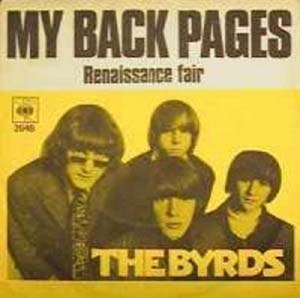

When the single then stalled at number 132 on the Billboard charts the band decided that they would not work with Johnston again. In that instance he incurred the band's wrath by overdubbing a female choir on to the recording, allegedly without the Byrds' consent. Johnston was employed once more as the band's producer on their May 1969 non-album single, "Lay Lady Lady". Hyde and, as a result, it was the only Byrds' album to be produced by him. Ultimately, the band were unhappy with Johnston's work on Dr. Faced with the need to find a replacement producer, the band elected to bring in Bob Johnston, who had been Bob Dylan's producer since 1965.

Prior to the recording of the album, the Byrds' record producer, Gary Usher, who had worked on the band's three previous albums, had been fired by Columbia Records for spending too much money on the recording of the Chad & Jeremy album Of Cabbages and Kings. Hyde is the only album in the Byrds' catalogue to feature McGuinn singing lead on every track. McGuinn felt that it would be too confusing for fans of the Byrds to have the unfamiliar voices of the new members coming forward at this stage and so White, Parsons and York were relegated to backing vocal duties during the recording of the album. The new band line-up, featuring McGuinn and White's dual guitar work, was regarded by critics and audiences as much more accomplished in concert than any previous configuration of the Byrds had been.Īmidst so many changes in band personnel, McGuinn decided that he alone would sing lead vocals on the band's new album, to give it a sense of sonic unity. John York, a session musician who had toured with Johnny Rivers, the Sir Douglas Quintet, and the Mamas & the Papas, was hired as his replacement on bass.

The new McGuinn, Hillman, White and Parsons line-up of the band was together for less than a month before Hillman departed to form the Flying Burrito Brothers with Gram Parsons. After the Newport Pop Festival appearance, White began to express dissatisfaction with the band's drummer, Kevin Kelley, and soon persuaded McGuinn and Hillman to replace Kelley with Gene Parsons (no relation to Gram), a friend of White's from their days together in the band Nashville West.

White, who had played as a session musician on the Byrds' previous three albums, was invited to join the band as a full-time member in July 1968. With an appearance at the Newport Pop Festival looming, McGuinn and Hillman moved quickly to recruit noted session guitarist and longtime Byrd-in-waiting, Clarence White. įollowing the departure of Gram Parsons from the band, lead guitarist Roger McGuinn and bass player Chris Hillman decided that they needed to find a replacement member to meet their forthcoming concert obligations. Hyde is the lowest charting album of the band's career in the United States, edging out the later Farther Along by one place. Hyde and also produced by Johnston, peaked at number 132 on the Billboard chart. In addition, a non-album single featuring a cover of Bob Dylan's " Lay Lady Lay", which was recorded shortly after the release of Dr. A preceding single, "Bad Night at the Whiskey" (b/w "Drug Store Truck Drivin' Man"), was released on January 7, 1969, but it failed to chart in the United States or in the United Kingdom. The album peaked at number 153 on the Billboard Top LPs album chart and reached number 15 on the UK Albums Chart. Hyde is unique within the band's discography for being the only album on which McGuinn sings the lead vocal on every track. It was the first album to feature the new band line-up of Clarence White ( guitar), Gene Parsons ( drums), John York ( bass), and founding member Roger McGuinn ( guitar). The album was produced by Bob Johnston and saw the band juxtaposing country rock material with psychedelic rock, giving the album a stylistic split-personality that was alluded to in its title. Hyde is the seventh studio album by the American rock band the Byrds and was released in March 1969 on Columbia Records.


 0 kommentar(er)
0 kommentar(er)
